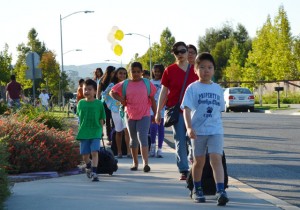I think the most significant of the new laws requires school districts to look for alternative, research-based programs to suspension. Districts will have to show that that the alternatives failed before they can suspend students. These programs are supposed to help kids figure out their bad decision-making instead of give them a free pass for a few days out of school.
The big question, naturally, is funding. A lot of districts are saying they don’t have the money for this.
But a number of districts are starting to gravitate toward these restorative justice programs, which have their critics -- they're too soft on kids, they say. They think these programs amount to a slap on the wrist, where all the kids have to do is say they're sorry and move on.
Plus a lot of teachers say they don’t want these alternatives to replace suspensions because when it comes down to it, sometimes you have to just remove a kid from the classroom, and you don’t have time to figure out how to adopt these restorative justice practices.
Another law gives administrators more of a say if they want to use alternatives to suspensions when it comes to really serious offenses. So when a child brings a weapon on campus, for example, under the state's current education code there’s a zero-tolerance policy. This new law gives administrators more discretion to find an alternative for that offense. And another law stops schools from denying enrollment to students who have been kicked out in the past.
School-performance measurements to change
Right now the state has a ranking system called the Academic Performance Index, in which test scores figure prominently. But one landmark measure for 2013 will change the way that index is measured for high schools, shifting away from a totally test-based model and bringing in broader measures.
This bill says test scores can’t account for more than 60% of a school's ranking; other measures will include graduation rates and student readiness for college and career. That’s a huge change because California’s been so focused on making sure academic measurement is all about test scores. This law takes a step back from that, making the evaluations a little more holistic.
So many educators say they feel like they have had to teach to the test, so now that tests won’t be as weighted as heavily, it’ll be interesting to see if that changes the approach in the classroom, and also if that impacts No Child Left Behind in terms of schools reaching certain benchmarks.
Free course materials for public university students
One of the complaints from students has been the rising cost of textbooks, and a new law that addresses this issue could be groundbreakng. A lot of people feel it could even turn the textbook industry on its head.
The law creates this open- source digital library where you'll be able to access free digital material for lower-division college courses, so you won’t have to buy textbooks for them. And professors will be able to mix and match what they want for their classes.
Faculties and/or new publishers will compete for bids to develop these new materials, and the hope is that they’ll have enough in place for 50 courses in the CSU and UC systems.
Pension reform
A new law changes pensions for public employees, and that includes teachers hired after the new year. It raises the retirement age for teachers and puts a ceiling on wages eligible for pensions.
